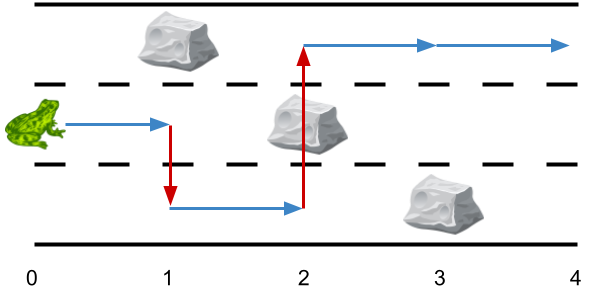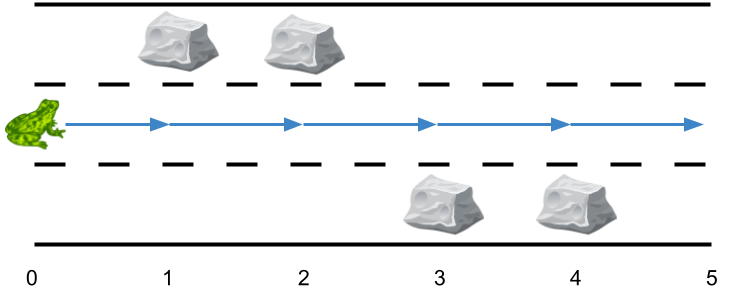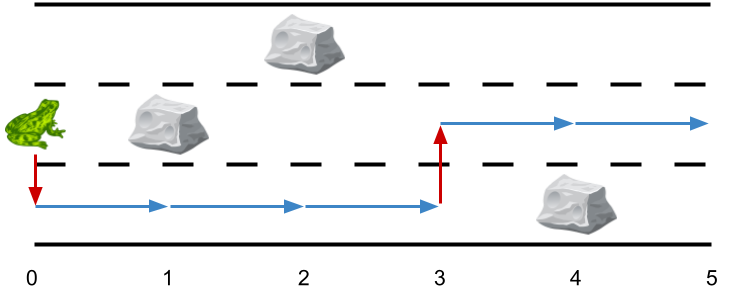1824. Minimum Sideway Jumps
Description
There is a 3 lane road of length n that consists of n + 1 points labeled from 0 to n. A frog starts at point 0 in the second laneand wants to jump to point n. However, there could be obstacles along the way.
You are given an array obstacles of length n + 1 where each obstacles[i] (ranging from 0 to 3) describes an obstacle on the lane obstacles[i] at point i. If obstacles[i] == 0, there are no obstacles at point i. There will be at most one obstacle in the 3 lanes at each point.
- For example, if
obstacles[2] == 1, then there is an obstacle on lane 1 at point 2.
The frog can only travel from point i to point i + 1 on the same lane if there is not an obstacle on the lane at point i + 1. To avoid obstacles, the frog can also perform a side jump to jump to another lane (even if they are not adjacent) at the same point if there is no obstacle on the new lane.
- For example, the frog can jump from lane 3 at point 3 to lane 1 at point 3.
Return the minimum number of side jumps the frog needs to reach any lane at point n starting from lane 2 at point 0.
Note: There will be no obstacles on points 0 and n.
Example 1:

Input: obstacles = [0,1,2,3,0] Output: 2 Explanation: The optimal solution is shown by the arrows above. There are 2 side jumps (red arrows). Note that the frog can jump over obstacles only when making side jumps (as shown at point 2).
Example 2:

Input: obstacles = [0,1,1,3,3,0] Output: 0 Explanation: There are no obstacles on lane 2. No side jumps are required.
Example 3:

Input: obstacles = [0,2,1,0,3,0] Output: 2 Explanation: The optimal solution is shown by the arrows above. There are 2 side jumps.
Constraints:
obstacles.length == n + 11 <= n <= 5 * 1050 <= obstacles[i] <= 3obstacles[0] == obstacles[n] == 0
Solutions
Solution: Dynamic Programming
- Time complexity: O(n)
- Space complexity: O(1)
JavaScript
/**
* @param {number[]} obstacles
* @return {number}
*/
const minSideJumps = function (obstacles) {
const MAX_OBSTACLES = 5 * 10 ** 5;
let land1 = 1;
let land2 = 0;
let land3 = 1;
for (const obstacle of obstacles) {
land1 = obstacle === 1 ? MAX_OBSTACLES : land1;
land2 = obstacle === 2 ? MAX_OBSTACLES : land2;
land3 = obstacle === 3 ? MAX_OBSTACLES : land3;
if (obstacle !== 1) {
land1 = Math.min(land1, Math.min(land2, land3) + 1);
}
if (obstacle !== 2) {
land2 = Math.min(land2, Math.min(land1, land3) + 1);
}
if (obstacle !== 3) {
land3 = Math.min(land3, Math.min(land1, land2) + 1);
}
}
return Math.min(land1, land2, land3);
};